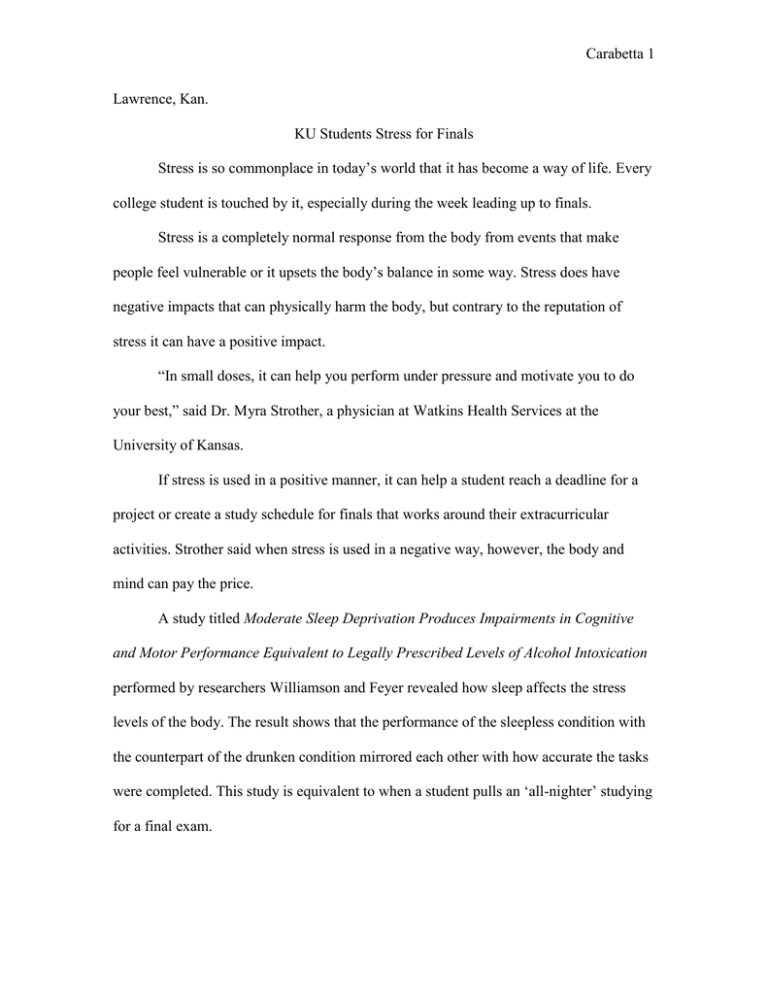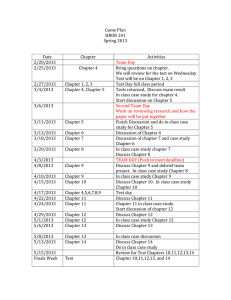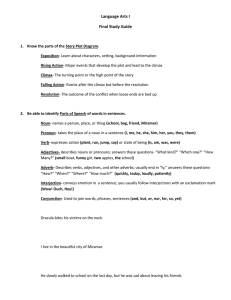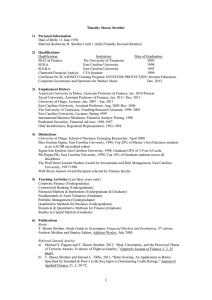Student Stress J 304 Final Project - Portfolios
advertisement

Carabetta 1 Lawrence, Kan. KU Students Stress for Finals Stress is so commonplace in today’s world that it has become a way of life. Every college student is touched by it, especially during the week leading up to finals. Stress is a completely normal response from the body from events that make people feel vulnerable or it upsets the body’s balance in some way. Stress does have negative impacts that can physically harm the body, but contrary to the reputation of stress it can have a positive impact. “In small doses, it can help you perform under pressure and motivate you to do your best,” said Dr. Myra Strother, a physician at Watkins Health Services at the University of Kansas. If stress is used in a positive manner, it can help a student reach a deadline for a project or create a study schedule for finals that works around their extracurricular activities. Strother said when stress is used in a negative way, however, the body and mind can pay the price. A study titled Moderate Sleep Deprivation Produces Impairments in Cognitive and Motor Performance Equivalent to Legally Prescribed Levels of Alcohol Intoxication performed by researchers Williamson and Feyer revealed how sleep affects the stress levels of the body. The result shows that the performance of the sleepless condition with the counterpart of the drunken condition mirrored each other with how accurate the tasks were completed. This study is equivalent to when a student pulls an ‘all-nighter’ studying for a final exam. Carabetta 2 Some students are aware that they need plenty of sleep in order to do well on their final exams. “I need a lot of sleep to function, so I make sure during finals time I use the time I set aside for studying very well so I can get as much sleep as possible,” said Abby Hughes, a Peer Health Educator at the University of Kansas. In addition to the psychological problems and benefits stress can have on the body there are also some physical difficulties that stem from sleep depreciation, such as: weight gain and digestive problems. There are two hormones that effect weight gain, ghrelin and leptin. Ghrelin is the hormone that tells the body when to eat and leptin is the hormone that tells the body when to stop eating. When sleep deprived the body will produce more ghrelin and less leptin, resulting in weight gain from the volume of food consumed. “I definitely eat more snack food I have in my room while I study,” said Camille Nuti, a sophomore at the University of Kansas. “I eat food that I can make quickly, like frozen foods I can microwave rather than taking the time to make a salad.” Strother said the digestive problems from sleepless nights can have long-term affects, such as gastro-intestinal discomfort and can even lead to diabetes or kidney failure. The way it could potentially lead to such severe circumstances is from how the body filters glucose (simple sugar) during the sleep cycle. “When the body rests it takes the time refresh itself and starts to filter out some of the sugars that are stored from what was eaten earlier in the day,” Strother said. If the body does not get constant rest, the glucose builds up, and that will directly affect the kidneys in a harmful fashion. A warning sign related to this buildup is gastro- Carabetta 3 intestinal discomfort. This is a painful pressure put on your abdomen that will seem subtle at first, but with time eventually it can grow into a pain similar to contractions experienced during childbirth. Strother said as stress can create problems, there are solutions to it. Many of the suggested solutions are to limit caffeine intake, indulging in physical activity and time management. Having too much caffeine in the body’s system can dehydrate it, making it difficult to retain short-term memories. “I swap out my soda and coffee for decaffeinated herbal teas during my finals, it makes me relaxed,” Nuti said. Hughes said making sure the body gets some form of exercise is important because the body still expels the ‘fight or flight’ hormones when under excessive stress. Allowing the body to move around for at least 15-30 minutes metabolizes the hormones and restores the body and mind to a calmer state. Time management is key for most students for success on their finals. “As a PHE I believe the best thing to do for finals is to prepare and to know how you study. If you start studying early, you will not stress as much,” Hughes said.






